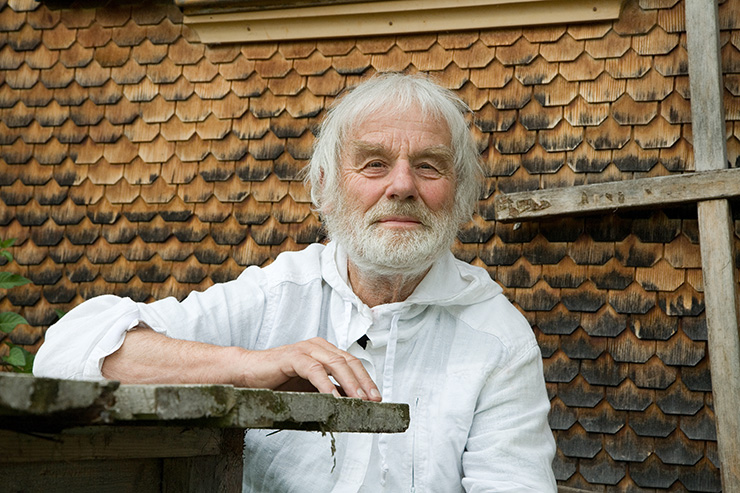
Ernst Sieber (1927–2018)
Pastor to the homeless, visionary of a world of justice and solidarity

“In the message of the cross, God revealed the powers people require to bring about a peaceful world. We must do something now. We must try to save the world today, not tomorrow.”
Ernst Sieber was born in Horgen, Canton Zurich in 1927, his father was an electrical engineer. Sieber first worked as a farmhand in the Sihl Valley and in French-speaking Switzerland, attended an agricultural school, and later wrote about his experiences: “I had a formative experience involving gratitude when I was working on the alp. On the way down into the valley I often met a local man. He always greeted me with a ‘Bhüet di Gott, dank dir Gott! – God protect you, thanks to God!’ […] Hardly any other saying made it as clear to me that gratitude was the path to God.” Sieber finished his diploma and went on to study theology in Zurich in the 1950s. Beginning as a trainee pastor in the slums of Paris, he went on to become the pastor in Uitikon-Waldegg in 1956, and was subsequently pastor of the Protestant parish in Zurich-Altstetten from 1967 until his retirement in 1992. Sieber liked to describe himself as a servant of God. The fact that he followed these words with deeds lent credibility to this assertion.
During the early 1960s, Sieber established his image as a pastor to the homeless. In the freezing cold winter of 1963, he set up accommodations for the homeless in an old bunker. This resulted in Suneboge, a self-governing residential and working community. After the Zurich youth riots of 1980, Sieber invited pastors from the Catholic, Old Catholic, and Reformed churches to found a group that mediated between and reconciled young people and the city. At the end of the 1980s, he began to take care of drug addicts in Zurich. This would lead to the provision of drop-in centers, emergency shelters, an AIDS hospice, and rehabilitation facilities. Sieber was happy to advocate loudly and in the media for the needs of the poorest. Using unconventional methods, he was even able to win over people critical of the church for himself and his ideas.
Sieber served as a father figure for the marginalized. He sensed where people’s resources lay and grasped others as a whole, not just focusing on their shortcomings, addictions, and illnesses. Sieber was thus able to touch people while allowing their suffering to touch him. From Sieber’s standpoint, God’s incarnation and Christ’s resurrection marked God’s promise that every human being would retain his or her dignity.
Over the course of time, Sieber was responsible for three dozen projects. In 1988, he founded the social service agency that would bear his name, which operated therapeutic living communities, emergency shelters, and meeting centers in four Swiss cantons. Following in the footsteps of Francis of Assisi, Sieber worked on a volunteer basis at the Pfarrer Sieber social service agency, with an annual budget of 22 million Swiss francs. When the foundation found itself in financial difficulty around the year 2000, the church, state, and individual donors saved it from bankruptcy.
From 1991 to 1995 Sieber was a member of the Swiss National Council on behalf of the Evangelical People’s Party. His gripping speeches in the Federal Palace, often help while holding up a wooden cross, were intended to remind politicians of their humanity. The reformer Huldrych Zwingli was an important inspiration for Sieber in his active struggle, but also in his concern for the disadvantaged. Sieber always saw his home in the Reformed Church with its enlightened religiosity and diaconal ministry.
Sieber’s wife, the singer Sonja Sieber-Vassalli, played an important role in his life and work. Together with her, Sieber raised eight children, four of his own and four adopted. His love of animals and art were important to Sieber in terms of maintaining his life balance, and he also wrote numerous books, painted, and sculpted. He remained very active up until his death, taking care of his favorite project – the “Pfuusbus”, an old truck that provided 40 beds for the homeless in winter.






